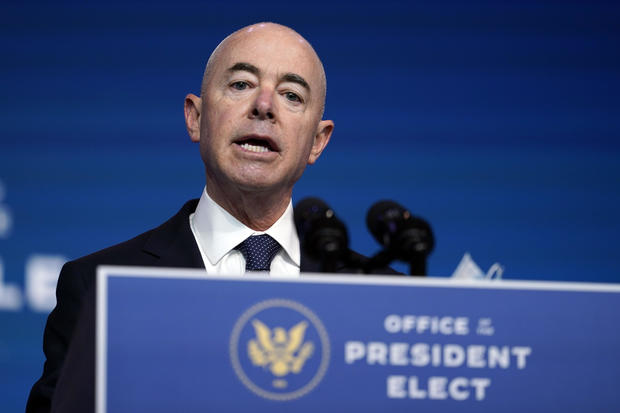[ad_1]
The Senate faces intense pressure to approve President-elect Joe Biden’s pick to lead the Department of Homeland Security (DHS), Alejandro Mayorkas, two weeks after the deadly assault on the U.S. Capitol.
The Senate Homeland Security and Governmental Affairs Committee is slated to holding a hearing on Mayorkas’ nomination Tuesday morning. It is one of five confirmation hearings senators have scheduled on the day before Mr. Biden is inaugurated.
The government’s third largest department, created after the 9/11 terrorist attacks, handles issues ranging from counter-terrorism and border security to immigration policy and disaster management. If confirmed, Mayorkas, the son of Cuban immigrants, would take the helm of a highly politicized 240,000-person agency that has seen a succession of temporary leaders during the Trump administration — six in four years – two Senate-confirmed, four acting.
Gil Kerlikowske, a former head of U.S. Customs and Border Protection (CBP) who worked with Mayorkas during the Obama administration, described him as a straightforward “known quantity” at the agency.
“He can be very direct when necessary, particularly during those fraught days,” Kerlikowske told CBS News, reflecting on the 2014 flow of unaccompanied minors and families from Central America seeking to enter the U.S. at the Mexican border.
Mayorkas would also inherit challenges inside the U.S., particularly the rise of domestic terrorism and anti-government militia groups, on display during the Capitol riot.
Carolyn Kaster / AP
Days after pro-Trump militias descended on the Capitol, four former homeland security secretaries — two Republicans and two Democrats — penned a letter published in the Washington Post urging the Senate to “promptly consider and confirm” Mayorkas.
“The president-elect could not have found a more qualified person to be the next homeland security secretary,” wrote Tom Ridge, Michael Chertoff, Janet Napolitano and Jeh Johnson. “Mayorkas needs no on-the-job training and will be prepared to lead DHS on Day 1.”
And while the former federal prosecutor appears likely to be approved by a simple majority as the Biden administration applies pressure on lawmakers to greenlight its national security team, it is unclear how long the process will take. Democrats will soon assume control of the Senate, but with a razor-thin majority.
Mayorkas is expected to face challenges from GOP senators, which could delay his confirmation. Republicans have expressed concerns over a 2015 inspector general’s report alleging that Mayorkas tilted the scales on behalf of well-connected Democrats applying for a program for wealthy immigrant investors when he served as director of the U.S. Citizenship and Immigration Services (USCIS).
Mayorkas would likely play a key role in Mr. Biden’s plans to reverse many of Mr. Trump’s immigration changes, which collectively restricted avenues for people to immigrate to and stay in the U.S.
Mr. Biden, for example, has pledged to safeguard the Deferred Action for Childhood Arrivals (DACA) initiative, a program for undocumented immigrants brought to the U.S. as children that Mayorkas implemented in 2012. Mayorkas, the son of Jewish refugees who fled Nazi Germany and then communist Cuba, will also be charged with helping to fulfill Mr. Biden’s pledge to dramatically increase refugee admissions, which Mr. Trump slashed to historic lows.
But the task at the U.S.-Mexico border would be formidable: reversing Mr. Trump’s restrictive asylum policies without triggering a sharp increase in unauthorized migration, which could provide political ammunition for Republicans and derail Mr. Biden’s immigration reform bill.
Mr. Biden and his immigration advisers say they want to avert a border crisis but warn that their plans to reverse Mr. Trump’s asylum policies will take time amid the pandemic.
Biden transition officials pledged last month to immediately start reviewing asylum cases of the most vulnerable migrants at the southern border. Advocates still intend to keep up the pressure to ensure that Mr. Trump’s obstacles to humanitarian protections are dismantled.
“It would be unrealistic to expect that all of the problems that came from the Trump administration and before to be undone in a single day,” said Kennji Kizuka, a senior researcher for Human Rights First, “but the incoming administration has the legal obligation to follow U.S. law and treaty obligations that the U.S. has taken on to protect refugees.”
But a challenge enveloping all of DHS will be re-establishing trust in the sprawling agency.
David Lapan, a retired U.S. Marine colonel who served as DHS press secretary during the Trump administration, remarked to CBS News that, “The Department of Homeland Security, the only federal agency whose primary mission is to protect the homeland — became under President Trump, the Department of immigration enforcement. The Department of Homeland Security has not upheld its mission. And I think across the government, we’ve seen damage to institutions, both in terms of trust and credibility.”
And Kerlikowske, the ex-CBP head said, “The public trust issue is pretty tough right now in law enforcement generally. But when you look at (U.S. Immigration and Customs Enforcement) or CBP, I think it’s even more critical right now.”
[ad_2]
Source link
